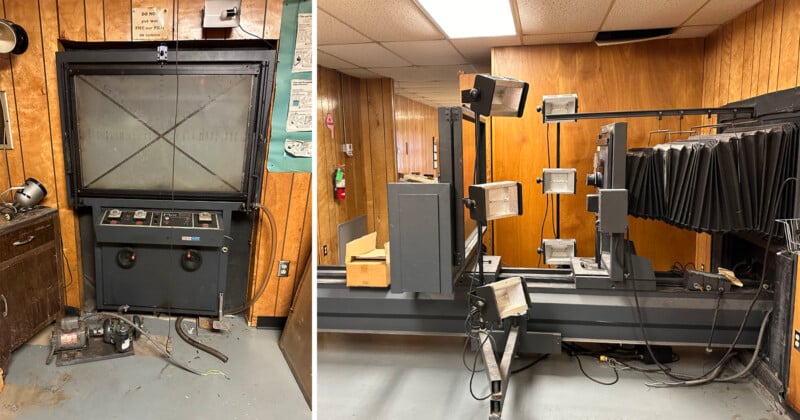
A Redditor has spotted an analog large-scale copy camera — a specialized camera used to make high-resolution copies of artworks — for sale at an auction house in Louisiana.
Also known as a process camera or repro camera, they were used in graphic arts, printing, and archival work to make large-scale copies of flat artwork, documents, or images. These cameras were widely used in pre-digital printing processes to create film negatives or positives from originals.
The listing of this particular large-scale copy camera, shared to r/photography, describes the device located at the University of Louisiana in Lafayette as a “large scale copy camera circa 1970”.
![]()
![]()
Wendy Fuselier from Facility Management explains to PetaPixel that the camera is located in the university’s print shop which is in the process of being moved to another building on campus.
“It takes up a lot of space, more than one room in fact, and is built into a wall,” Fuselier says. “It is reported that the camera was working when it was last in use, about 20 years ago.”
![]()
A Redditor who says they used to work with a similar camera commented on the post revealing what it was like to operate such an enormous camera.
“This was a horizontal graphics copy camera, often used to print shops for creating film copies from large artwork. It could take 16×20 or 20×24 film,” says the Redditor.
“While it could be used to photograph 8×10 transparency or negatives, primarily it was used on Kodalith line art film. Somebody would load the front end with artwork, which tilted a large glass art holder into the horizontal orientation to match the film holder in the back.”
![]()
The anonymous Redditor describes the camera as a “super heavy beast” and said operating it was a workout.
“They were found at photo studios, commercial photo labs, and print shops,” the person explains. “The guy in the back would have shoulder issues and one hell of a bicep after a lot of use.
“The poor person in the front would have the same sore arms, but would also suffer from heat exhaustion from the blindingly bright halogen copy lights that ran on each side of the artwork holder and took a few thousand watts.”
Fuselier tells PetaPixel that the University would “love to find a buyer for it.” The listing — which ends tomorrow — can be found here.
